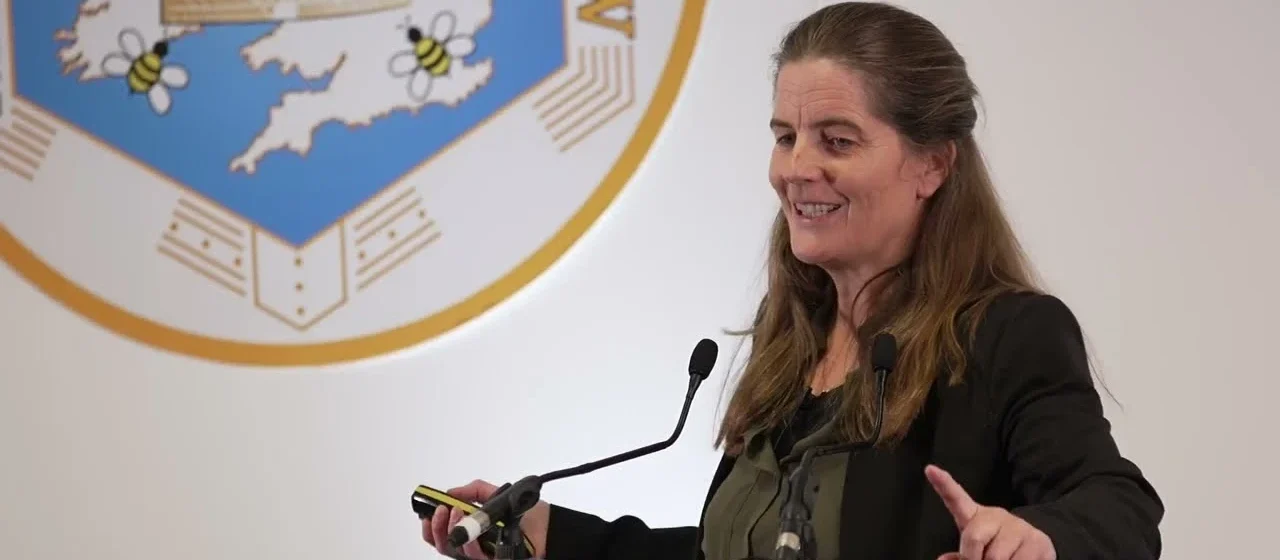
Few people have done more to illuminate the genetic heritage of Ireland’s honey bees than Professor Grace Patricia McCormack, Personal Professor of Zoology and Head of the School of Natural Sciences at the University of Galway. Her work bridges evolution, molecular biology, and conservation – drawing together threads from marine sponges to honey bee genetics in a body of research that speaks to the interconnectedness of life itself.
A Career Rooted in Evolutionary Curiosity
Professor McCormack’s scientific journey began at University College Galway, where she earned her BSc and later her PhD in Zoology. From there, she gained international experience as a postdoctoral researcher in London – first at the Natural History Museum and later at the Health Protection Agency – before returning to Ireland to lecture in Biology at Maynooth. By 2004, she had joined NUI Galway’s Zoology Department, rising through the ranks to become Head of Zoology and eventually Head of the School of Natural Sciences in 2021.
Throughout her career, her focus has remained constant: understanding how organisms evolve, adapt, and interact with their environments. Her research group explores evolutionary relationships across a wide range of organisms, using both traditional and cutting-edge molecular tools to uncover the hidden stories written in DNA.
Two Worlds: Sponges and Bees
It might seem an unlikely pairing – marine sponges and honey bees – but both reveal profound insights into survival and adaptation.
In the deep and cold waters off Ireland’s coast, McCormack’s team studies sponges not only as evolutionary relics but as chemical powerhouses. They investigate the symbiotic microbes that live within sponges, the compounds they produce, and how these might one day lead to novel pharmaceuticals. Using techniques like genomics, transcriptomics, and metabolomics, her group is uncovering the genes responsible for bioactive compounds and skeletal formation, linking biodiversity with potential biotechnological breakthroughs.
On land, her research turns to the dark native honey bee, Apis mellifera mellifera – a subspecies uniquely adapted to Ireland’s cool, damp climate. Through genomic and population studies, McCormack and her team have demonstrated that pure native bees still exist across the island, despite widespread hybridisation elsewhere in Europe. Even more strikingly, they have documented hundreds of wild colonies surviving year after year without chemical treatment for Varroa destructor, the devastating mite that has decimated colonies worldwide.
These discoveries have sparked hope and renewed focus on conservation and selective breeding of Varroa-tolerant Irish bees. The implications for beekeepers are enormous: understanding the genetics behind resilience could help sustain healthy colonies naturally adapted to local conditions.
Mentoring the Next Generation of Scientists
Under Professor McCormack’s supervision, a vibrant team of PhD students is carrying forward her legacy of curiosity and rigour. Their research spans from the molecular systematics of sponges to the genomics of honey bee resistance. Projects include identifying gene clusters behind bioactive compounds, exploring sponge biomineralisation for novel materials, and using data science to track hybridisation patterns among wild bees.
Together, these scientists contribute not only to academic knowledge but also to real-world sustainability, aligning with the UN’s Sustainable Development Goals on biodiversity, responsible resource use, and ecosystem protection.
A Voice for Conservation
Professor McCormack is also an eloquent advocate for pollinator conservation, calling for greater awareness of Ireland’s native bee populations and the threats they face. In public talks and interviews, her enthusiasm is unmistakable. She describes Apis mellifera mellifera as a “bee built for Ireland” – dark, robust, and resourceful – perfectly attuned to short foraging windows and unpredictable weather.
Her message is clear: these bees are part of Ireland’s natural heritage, and protecting their genetic integrity is both an ecological and cultural responsibility. Hybridisation with imported subspecies, habitat loss, and overreliance on chemical treatments all pose risks to the long-term survival of the native bee. Yet McCormack’s research offers a note of optimism – evidence that, given space and understanding, Ireland’s bees can thrive.
A Legacy of Science and Stewardship
Whether peering through a microscope at sponge cells or sequencing the DNA of a wild colony in Connemara, Grace McCormack’s work reminds us of the elegance of nature’s design. Her science is both precise and profound, offering practical tools for conservation while deepening our understanding of life’s intricate web.
In a world where biodiversity faces mounting pressure, her research stands as a testament to what’s possible when scientific excellence meets environmental passion. For anyone invested in the future of Irish beekeeping, marine conservation, or evolutionary biology, Professor McCormack’s contributions are nothing short of inspiring.

[…] by Prof. Grace McCormack and Norman […]